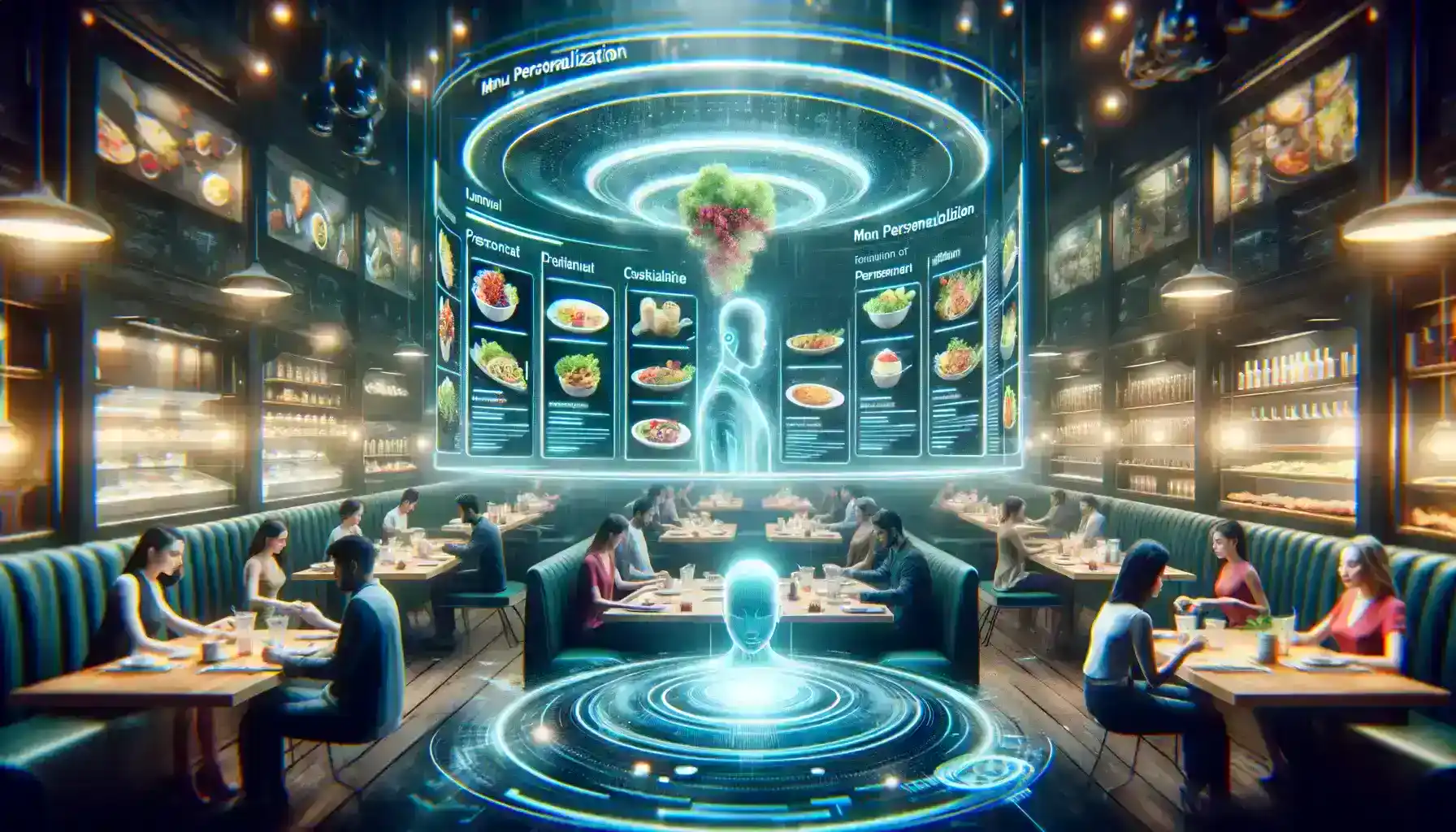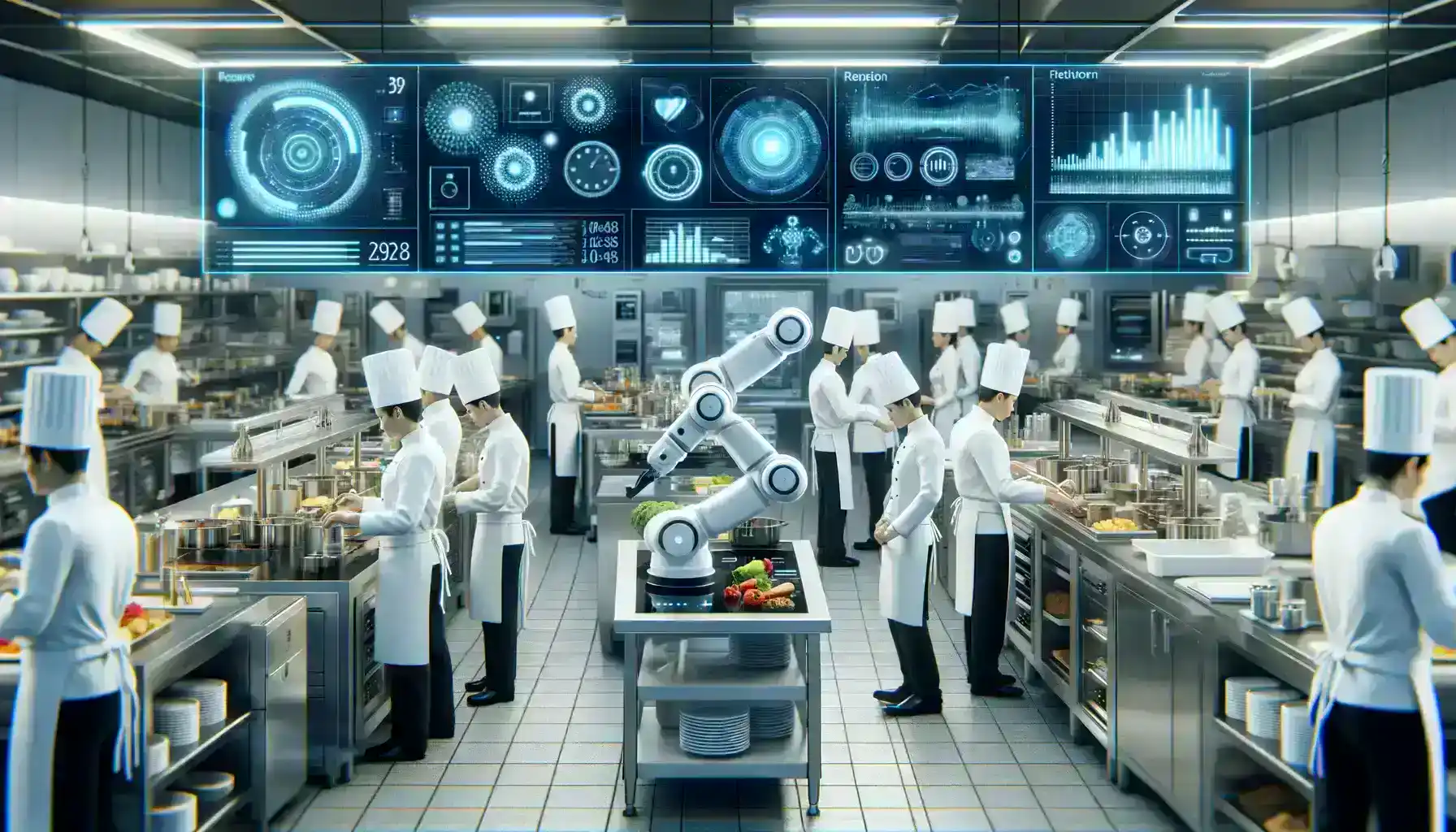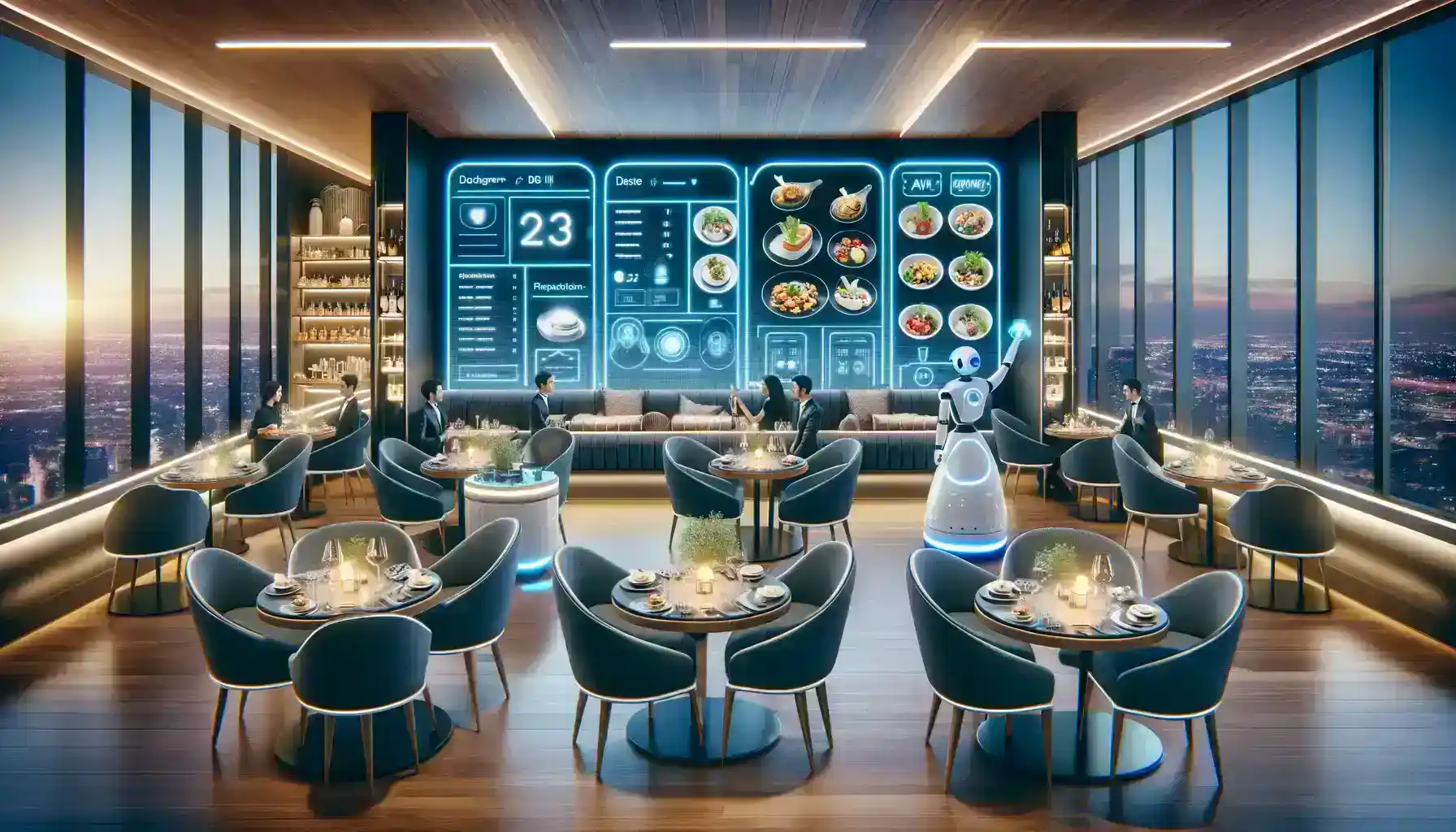Table of Contents
In recent years, the hospitality industry has witnessed a remarkable transformation driven by the integration of artificial intelligence (AI) into various facets of AI in hotel operations. One of the most fascinating domains where AI has made a substantial impact is AI in hotel dining. The marriage of culinary arts with cutting-edge AI technology has redefined the way guests experience hotel dining, elevating it to new heights of excellence and personalization.
In this article, the transformative potential of AI in hotel dining explores five pivotal ways through which it can elevate the dining experience to unprecedented levels of excellence. These five aspects encompass AI-powered menu personalization, streamlined kitchen operations, enhanced guest services, improved food quality and consistency, and the crucial role of data analytics for continuous improvement.
Each of these facets represents a significant stride in the journey toward redefining AI in hotel dining, all while keeping the focus firmly on providing guests with a memorable and satisfying experience.
1. AI-Powered Menu Personalization
The role of AI in hotels for personalizing menus in dining establishments. The use of AI in this context revolves around enhancing the guest experience by tailoring the menu to individual preferences, which is increasingly becoming a game-changer in the hospitality industry.
The role of AI in hotels for personalizing menus in dining establishments. The use of AI in this context revolves around enhancing the guest experience by tailoring the menu to individual preferences, which is increasingly becoming a game-changer in the hospitality industry. Additionally, incorporating a menu maker can further refine this process, allowing for seamless integration of AI-driven personalization techniques into menu design and presentation.
- The advantages of AI-driven menu personalization are manifold. Firstly, it enhances guest satisfaction by presenting them with options that align with their tastes and dietary requirements. This not only increases the likelihood of a positive dining experience but also encourages repeat visits and positive reviews.
- Secondly, AI in hotels can optimize their inventory and reduce food waste by offering items that are more likely to be ordered, reducing the need for excessive preparation. This not only benefits the hotel’s bottom line but also contributes to sustainability efforts.
- Marriott International has integrated AI into its dining operations through its “MChef” platform. MChef uses AI to analyze guest profiles, culinary preferences, and dietary restrictions. It then provides personalized menu recommendations to guests during their stay. This has led to a significant increase in guest satisfaction scores and repeat business.

Challenges and How to Overcome
- While AI-driven menu personalization offers numerous benefits, it does come with challenges. One major concern is data privacy, as AI in hotels must handle guest data responsibly. Ensuring data security and gaining guest consent for data usage is essential.
- Hotel staff must be trained to manage and interpret AI-generated recommendations effectively. AI algorithms need continuous fine-tuning to remain accurate and up-to-date.
- Addressing these challenges and harnessing the power of AI in hotel menu personalization can provide guests with unique dining experiences that cater to their individual preferences, leading to increased guest satisfaction and loyalty.
2. Optimizing AI in Hotel Kitchen Operations
AI can enhance kitchen operations within hotels, focusing on streamlining workflows, efficient inventory management, and reducing food waste.
- Streamlining Kitchen Workflows with AI: AI-powered systems can provide chefs with real-time recipe guidance, ensuring consistency and quality in every dish. AI algorithms analyze historical data to predict cooking times and temperature adjustments, helping chefs prepare meals more efficiently can prioritize orders based on complexity, ensuring that more time-sensitive dishes are prepared promptly.
- AI-Assisted Inventory Management: AI can predict demand patterns, helping AI in hotels order the right quantities of ingredients and reduce overstocking or understocking systems can monitor product shelf life and alert staff to use items before they expire. Integrating AI with suppliers’ systems can streamline the ordering process and ensure timely deliveries.
- Yotel, a tech-forward hotel brand, uses AI robots in their kitchen to automate various tasks, including food preparation and delivery to guest rooms.
3. Enhancing Guest Services
In the fast-paced world of the hotel industry, providing exceptional guest services is paramount. This includes personalized assistance, prompt responses to inquiries, and ensuring guest satisfaction. AI-driven solutions have emerged as a game-changer in this regard.
- AI-driven chatbots and virtual concierges are becoming increasingly common in the hotel industry. These automated systems are available 24/7 to assist guests with their queries and requests.
- For instance, when a guest arrives at a hotel and has questions about amenities, nearby attractions, or check-out times, they can simply message the hotel’s chatbot through their smartphone or a tablet in their room.
- AI can significantly improve response times when guests seek assistance. Unlike human staff who may be occupied with multiple tasks, AI systems can handle multiple inquiries simultaneously and provide immediate responses. This speed of service can greatly enhance the guest experience.
- Hilton Hotels deployed an AI-powered robot concierge named Connie. Connie uses natural language processing to interact with guests, answer questions, and provide recommendations.

4. Improving Food Quality and Consistency
Consistency in food quality is a critical aspect of any hotel’s dining experience. Hotels must strive to offer guests the same high-quality dishes every time they visit. AI plays a pivotal role in achieving this level of consistency.
- Maintaining Consistent Food Quality: AI systems are equipped with sensors and data analytics capabilities that allow them to monitor various aspects of food preparation. For instance, temperature, cooking time, and ingredient proportions can all be closely monitored by AI.
- Monitoring and Adjusting Cooking Processes: One of AI’s remarkable capabilities is its ability to adapt and make real-time adjustments during the cooking process. For instance, in a hotel’s busy kitchen, AI can continuously analyze cooking conditions and adapt to factors such as humidity, air pressure, or variations in ingredient quality.
- Success Stories of Hotels Using AI for Food Quality Control: Many hotels have embraced AI to elevate their dining experiences. For instance, a luxury resort in the Maldives implemented AI-powered food quality control systems in its fine dining restaurants. These systems monitor every step of the cooking process, from ingredient selection to plating.
- AI-Driven Culinary Innovations: AI is driving culinary innovations in hotels. Some establishments are using AI to create entirely new dishes based on guest preferences and dietary restrictions.
5. Data Analytics for Continuous Improvement
In the rapidly evolving world of hotel dining, data analytics has emerged as a pivotal tool for achieving continuous improvement, and artificial intelligence (AI) plays a central role in this transformative process.
- AI-driven data collection starts with the aggregation of various types of information, including guest preferences, dining habits, and operational data. This information is collected through various touchpoints such as reservations, guest feedback, loyalty programs, and even sensors embedded in dining areas.
- AI excels in sifting through vast datasets at remarkable speeds, identifying patterns, and extracting valuable insights that might remain hidden in human analysis. It can effortlessly analyze customer behavior, track purchasing patterns, and assess the popularity of specific menu items.
- By continually collecting and processing data, AI ensures that hotels have access to real-time information, enabling them to adapt quickly to changing trends and preferences
- The true power of AI in data analytics lies in its ability to generate actionable insights. By recognizing patterns in guest behavior and dining trends, AI empowers hotel management and culinary teams to make informed decisions that directly impact the dining experience.
- AI-powered chatbots and virtual concierges can enhance the guest experience by providing personalized dining recommendations, answering queries promptly, and even taking orders.

Conclusion
In the world of hotel dining, the integration of AI (Artificial Intelligence) stands as a defining milestone on the path to culinary excellence. It has become increasingly clear that AI is not just a buzzword but a transformative force, offering AI in hotels a multitude of opportunities to provide exceptional dining experiences while maintaining efficiency and responsiveness.
Throughout this article, we’ve explored five crucial ways in which AI is leveraged to elevate AI in hotel dining to new heights. AI’s role in menu personalization, kitchen operations, guest services, food quality control, and data analytics has been demonstrated as pivotal in reshaping traditional dining paradigms.
Guest services are enhanced through AI-powered chatbots and concierges, offering instant assistance and recommendations. Food quality and consistency are ensured through precise control and monitoring. Lastly, AI-enabled data analytics provide a continuous feedback loop, helping hotels stay ahead of trends and continuously improve.
The importance of AI in hotel dining cannot be overstated. It goes beyond mere automation; it embraces the rich tapestry of guest preferences, operational nuances, and culinary creativity. AI doesn’t replace the human touch but augments it, allowing hotel chefs and staff to focus on what they do best – creating memorable and delightful dining experiences.
AI in hotel dining, it is evident that the future holds even more exciting possibilities. With advancements in AI technology, the hospitality industry will continue to explore innovative ways to merge tradition and technology seamlessly. It’s a future where guests can expect nothing less than extraordinary dining experiences, where every dish served tells a story of craftsmanship and personalization.
In this ever-evolving landscape, embracing AI in hotel dining is not an option but a necessity for staying competitive and exceeding guest expectations. By harmonizing tradition with technology, hotels can ensure that their culinary offerings remain at the forefront of the hospitality industry, leaving a lasting impression on every guest who walks through their doors.